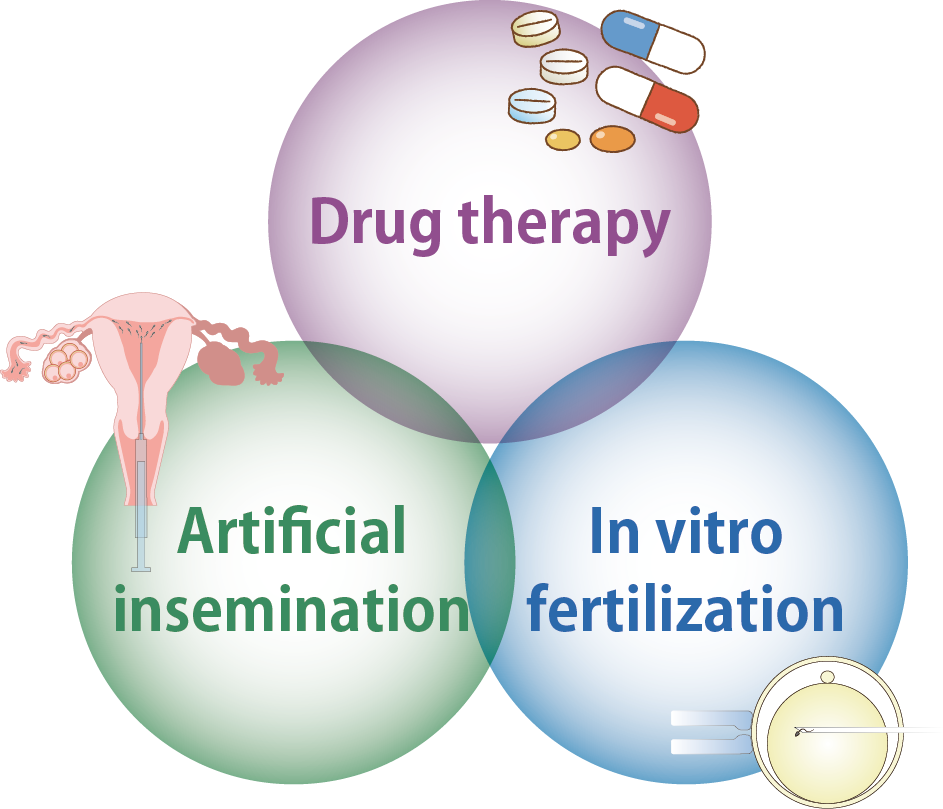Treatment other than spermatogenesis dysfunction.
There may be no abnormality in the semen findings, but the sperm may not be able to reach the reproductive tract of the spouse, or there may be sexual dysfunction such as erectile dysfunction, ejaculation disorder, or sexual desire disorder.
Our hospital provides medical treatment tailored to each individual case, including counseling, drug therapy, artificial insemination, and in vitro fertilization.
ED
Treatment of ED focuses on drug therapy.
PDE-5 inhibitors (Viagra and Cialis) are prescribed for treatment.
However, this drug does not lead to the fundamental treatment of ED itself, but only helps in the onset and maintenance of an erection.
In addition, this medicine may not be prescribed to people with a history of hypersensitivity to the ingredients of this drug or those with heart abnormalities.
Regarding the prescription process, you will be asked to fill out a medical questionnaire, and after your blood pressure is measured, we will prescribe the medication.
Poor postcoital test (Hooner test)
Before ovulation, mucus increases in the cervix at the entrance to the uterus, making it easier for sperm ejaculated into the vagina to enter the uterus.
However, if the cervix is inflamed or if there are antibodies in the mucus that kill sperm, sperm cannot enter the cervix or, if they do enter, they cannot move within it.
A postcoital test (Hooner test) is used to check if this is happening.
The test method involves having sex before ovulation, when cervical mucus is thought to be coming out, and then taking a small amount of mucus from the inside of the cervix and examining it under a microscope.
If there are healthy sperm in the semen and there is no cause for the sperm to stop in the mucus of the cervix, you should be able to see several actively moving sperm in the mucus.
If there are no problems in the semen analysis but there are abnormalities in the postcoital test, AIH (artificial insemination) is indicated.
If you do not get pregnant after performing AIH 3 to 6 times, we recommend a step-up.

Impaired fertilization
Normally, in timing therapy and AIH (artificial insemination), the sperm and egg meet and fertilize, but it is not known whether or not the egg is fertilized.
When ART (Advanced Reproductive Medicine) is used for unexplained infertility, one of the abnormalities that can be detected is fertilization disorders.
If normal in vitro fertilization (IVF, in which eggs are sprinkled with sperm adjusted to an appropriate concentration and waited for fertilization) does not result in fertilization, in vitro fertilization using microscopic insemination (ICSI) is performed.
Retrograde ejaculation
Imipramine 50-70mg is taken orally every day.
It cannot be used if you have glaucoma or heart abnormalities.
However, treatment often does not improve the condition, and if you wish to have a baby, artificial insemination, in vitro fertilization, or microinsemination may be performed.
When performing artificial insemination or in vitro fertilization, sperm are collected directly from the bladder at the time of egg retrieval.









